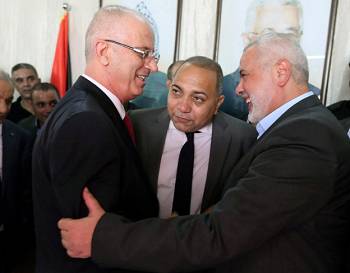Representatives from the Palestinian political parties of Hamas and Fatah are meeting on Tuesday for reconciliation talks in the Egyptian capital, Cairo.
The talks come a week after Palestinian Authority (PA) Prime Minister Rami Hamdallah visited the Gaza Strip to kick-start the process of transferring administrative responsibility for the besieged territory from Hamas to the national consensus government.
The meetings in Cairo are centered around implementing the 2011 Cairo Agreement between the two political parties, in hopes of ending a 10-year political schism.
Leading the delegations are the deputy head of Hamas's political office, Saleh al-Arouri, and a member of the Fatah Central Committee, Azzam al-Ahmad.
A member of Hamas in the occupied West Bank, Hassan Yousef, said that Israel blocked a delegation from travelling to Cairo through Jordan to participate in the talks.
Khalil al-Haya, a member of the Hamas delegation, said the mission would discuss forming a national unity government with the participation of all Palestinian political parties and preparing for legislative, presidential and national council elections.
Haya said the negotiations would focus on ending Palestinian division "to confront intransigence and the Israeli project".
The 2011 agreement stipulated that legislative, presidential and national council elections should be conducted within one year of its signing. The deal would see both Hamas and Fatah form a Palestinian government to appoint the prime minister and ministerial positions.
Fatah spokesman Osama al-Qawasmeh told the official PA radio that the Egyptian-brokered talks would stretch for three days and would focus on enabling the national consensus government to exercise its political, security and economic functions in Gaza.
Other issues on the agenda include Gaza's electricity crisis, the salaries of PA employees in the coastal enclave, security and the administration of border crossings.
Over the last few months, Hamas has been under heavy pressure from PA President Mahmoud Abbas' measures against Gaza, aimed at pressuring Hamas to relinquish control of the territory. Punitive measures included cutting the salaries of PA employees living in Gaza and requesting Israel to reduce the electricity supply to the territory.
If the reconciliation efforts are successful, they could temporarily ease Gaza's dire humanitarian situation.
Sticking points
Despite the latest Egyptian initiative to end the divide between the West Bank-based PA, led by Fatah, and the Hamas movement in the Gaza Strip, several potential obstacles could cause a national unity government to falter.
Hamas' preferred method of armed resistance in facing Israel is among the main obstacles, analysts say.
Last week, Abbas called on Hamas to surrender its weapons. Speaking to Egyptian television, Abbas called for "one state, one regime, one law and one weapon".
Hamas, on several occasions, has stressed that the issue of armed resistance is not up for discussion. "The resistance's weapons are legal," spokesperson Hazem Qassem told the local Maan News Agency. "They are here to protect Palestinians and free their lands [from Israeli occupation]."
Hamas has been Gaza's de facto ruler since 2007, when the party defeated Abbas' long-dominant Fatah party in parliamentary elections.
Hamas then pushed Fatah out of Gaza in a bloody conflict. Hamas and Fatah have ruled the Gaza Strip and the West Bank respectively ever since.
Hamas' control over security and its nature as an armed resistance movement have constituted an obstacle for the PA, which cooperates with Israel on security-related matters as per the Oslo Accords.
Ibrahim Abrash, a political analyst and Gaza's former culture minister, said some issues, such as Hamas' recognition of Israel and the 1967 borders, "will take time to iron out ... but the dire situation in Gaza cannot withhold waiting any longer".
Abrash told Al Jazeera that while he believes Fatah is serious about carrying out presidential elections, the fear is that Israel will get involved.
Abbas' term expired in 2009, and presidential elections have not been held since.
"The last time Hamas joined elections in 2006, Israel carried out a campaign of arrests against Hamas parliamentarians. There needs to be some Arab and international guarantees that things would go smoothly," said Abrash.
On the issue of armed resistance, Abrash said Israel would make it "very difficult" for the unity government to carry out its duties. "This would mean that the political system would be faulty, with some factions carrying weapons and others not. I think these issues will not be opened now, but in the end, this issue will explode if the root of it is not solved."
PHOTO CAPTION
Palestinian Prime Minister Rami Hamdallah (L) shakes hands with Hamas Chief Ismail Haniyeh in Gaza City October 2, 2017. REUTERS
Al-Jazeera


 Home
Home Discover Islam
Discover Islam Quran Recitations
Quran Recitations Lectures
Lectures
 Fatwa
Fatwa Articles
Articles Fiqh
Fiqh E-Books
E-Books Boys & Girls
Boys & Girls  Ramadan
Ramadan Fatwa Audios
Fatwa Audios Month of Mercy
Month of Mercy Women
Women Eed Al- Fitr
Eed Al- Fitr Food Recipes
Food Recipes Videos
Videos

 Prayer Times
Prayer Times












